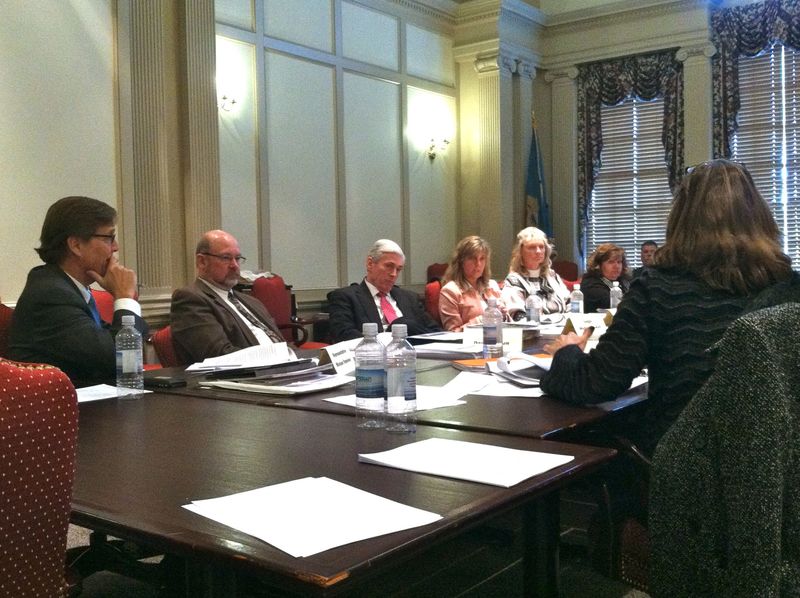Task force: Open Family Court

Delaware residents say opening Family Court will hold all parties accountable.
Delaware’s Family Court Task Force met Jan. 7 at Legislative Hall in Dover. The group is tasked with recommending to the General Assembly whether all Family Court proceedings - which are all currently closed - should be open to the public.
During an hour-long public comment period before the meeting began, no one supported holding Family Court behind closed doors.
Milton resident Brendan Buschi said he was a social worker for more than 30 years, and he testified at many Family Court proceedings. He said the court’s primary concern is money, and rulings are seldom made in the best interests of the children involved. “Children are the cannon fodder,” he said.
Buschi said he has witnessed court rulings that result in children being physically and sexually abused. Opening Family Court would benefit the children involved by setting the stage for people to behave honestly and fairly, including judges, he said. “Most muggings take place on dark streets,” he said.
Others based their comments on specific cases.
“It’s no secret that Family Court is a game of dirty pool,” said Kent County resident Matthew Watson.
He said during his divorce proceedings, he believes his ex-wife lied to the court about his behavior. Had members of his family been in the courtroom while she was testifying, Watson said, she would not have made the same statements because she would not have been able to face his family afterwards. “It’s all about accountability,” he said.
Attorneys and judges must also be held accountable, Watson said. Attorneys don’t want to anger the judge or commissioner, he said. “They don’t stand up for you,” Watson said.
Opening the court would result in attorneys that are more concerned about their clients and less worried about angering the judge, he said.
Watson also said the Family Court commissioner who ruled on his case set his income level for child support $32,000 above his base pay. “My commissioner made some very inappropriate statements,” he said.
Watson said he paid for a recording of the proceeding, but it did not include the commissioner’s inflammatory statements. “If it was open, now I’d have witnesses. That holds the court accountable,” he said.
Smyrna resident Don Blow said of Family Court, “There is no fear of accountability...because there is no fear of exposure.”
Martha Denison, a former officer with New Castle County Civic League, said she was appalled at the behavior of a Family Court commissioner. “You have to make sure you’re giving these attorneys and these judges their accountability,” she said. “These courtrooms need to be open.”
New Castle resident Cynthia Smith said during her Family Court hearing she felt the judge did not rule based on evidence or what was in the best interest of her children. “I have not seen my kids for nine years,” she said.
Smith said she had no representation in divorce court, and she was not given the opportunity to present any evidence in her own favor. “In my opinion, the decision is already made before you even get heard,” she said. “It should be open.”
Smith said she visited Hartford, Conn., to sit in on a day of child support hearings, which are open to the public. She submitted a report of her visit to the task force.
Co-chairwoman Lynn Kokjohn said task force member Sen. Dave Lawson, R-Marydel, is tasked with bringing information to the committee from states with open Family Courts. Smith said Lawson brought no information to the task force’s last meeting.
Lawson did not attend the public comment session. When the task force meeting convened, he made no comment as to whether he had visited out-of-state courts that held open proceedings.
Lawson read a mission statement from the Connecticut Courts, which says, “The mission of the Connecticut Judicial Branch is to serve the interests of justice and the public by resolving matters brought before it in a fair, timely, efficient and open manner.”
A child’s role in Family Court
By the end of a two-hour meeting, members of the task force agreed most Family Court proceedings should be open, including divorce, custody and alimony hearings. The task force added that a judge could decide to close the hearing based on certain criteria, such as the mental capacity of the parties involved, expert opinions or the safety of the litigants and courtroom staff.
Hearings involving adoption and termination of parental rights should remain closed, the task force decided.
Several members said they wanted to ensure children were kept out of the courtroom during most hearings. Child psychologist Joseph Zingaro said he sees no value in a child ever being present in the courtroom during a parent’s custody hearing.
Delaware Family Court Chief Judge Chandlee Kuhn said if she needs testimony from a child, she normally interviews the child in judge’s chambers – with staff but without the child’s parents. She obtains the child’s testimony in private to include it in the record, she said.
Kuhn said she asks litigants not to bring their children into the courtroom, but other judges specifically request the children’s presence during custody hearings.
“There are times when a 16- or 17-year-old is a very important aspect to the case,” Kuhn said. “I think there is a place and a time for some children.”
Tania Culley, of the Office of the Child Advocate, said there is a movement to allow youth involvement in court. She said foster children especially have said they want to be part of a decision that affects their life.
“All I want is a door open for that right kid,” Culley said.
The task force voted unanimously to recommend custody and visitation proceedings should be open to adults; children should be allowed in the courtroom only at the discretion of the judge or commissioner.
Judge warns of unintended consequences
Members also grappled with whether the litigants should be allowed to decide they want the hearing closed.
Raetta McCall, of the Family Law Commission, said the Family Courts in Massachusetts are open regardless of the wishes of litigants.
Kokjohn and Rep. Mike Ramone, R-Middle Run Valley, said if both litigants want to hold the proceedings in private, that should be allowed.
The court could face a lawsuit from the press or other entities if it allows litigants to close the courtroom to the public, Kuhn said. “I don’t want to end up in litigation,” she said.
Patricia Dailey Lewis, of the Attorney General’s Office, noted a lawsuit brought by Delaware Coalition for Open Government against Delaware Chancery Court judges for holding proceedings behind closed doors. A federal appeals court sided with DelCOG in October, calling the secret arbitrations unconstitutional.
Opening the Family Court system will be difficult at first, Kuhn said. “It’s going to be new and different,” she said. “There will be unintended consequences.”
“Open the courts,” Ramone said. “But have these caveats where the judges have the discretion to close the courtroom.”
The task force is scheduled to meet and finalize its recommendations at 10 a.m., Thursday, Jan. 23, at Legislative Hall. Members of the public may provide input during a public comment session at 9 a.m. – one hour prior to the meeting. Members of the public can also provide comment by emailing dick.carter@state.de.us.
The task force is scheduled to deliver its full recommendation to the General Assembly by Saturday, Feb. 15.



















































